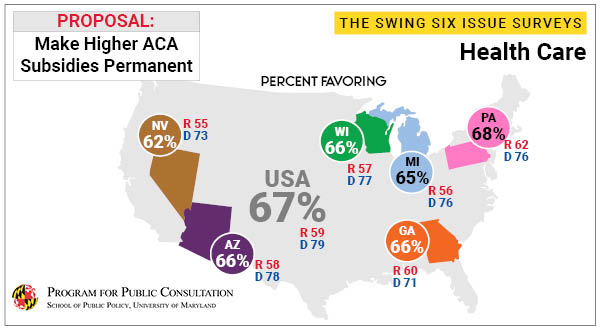
In Six Swing States, Democrats and Republicans Agree on How to Lower Health Care Costs
As the price of health care continues to rise faster than wages, a new public consultation survey by the Program for Public Consultation (PPC) finds bipartisan majorities of Americans in the six swing states of Arizona, Georgia, Michigan, Nevada, Pennsylvania, and Wisconsin, as well as nationally, support major proposals for lowering health care costs. [More Detailed Report]
Capping Drug Prices
The Federal government capping the price of all drugs to what is charged in other developed countries is favored by large majorities in every swing state (77% to 81%), including majorities of Democrats (84% to 87%) and Republicans (72% to 82%). Nationally, a large bipartisan majority (78%) is also in favor.

Making Higher ACA Subsidies Permanent
Making permanent the pandemic-era law that temporarily increased Affordable Care Act (ACA) subsidies for lower and middle income households is favored by nearly two-thirds in every swing state (62% to 68%), including majorities of Democrats (71% to 78%) and Republicans (55% to 62%). Nationally, a bipartisan majority of 67% is in favor. Subsidies are scheduled to return to pre-pandemic levels in 2026.
Revoking Patents for Unaffordable Drugs Developed with Federal Aid
Allowing the Executive Branch to revoke patents for drugs developed with federal aid, which are unaffordable for most who need them,is favored in every swing state (74% to 77%), including Democrats (79% to 84%) and Republicans (70% to 75%), as well as nationally (73%). [BAR GRAPH]
Prohibiting Deals that Delay the Release of Generic Drugs
Prohibiting “pay-to-delay” – in which brand-name drug companies preserve their ability to charge high prices by paying generic drug companies to delay bringing their generic version to market–is favored by majorities in every swing state (72% to 77%), including Democrats (75% to 84%) and Republicans (68% to 72%), as well as nationally (71%). [BAR GRAPH]
Requiring Price Transparency for Health Care Costs
Price transparency – requiring that health and insurance providers make prices publicly available as a means of promoting competition and lowering costs – has been enacted by both the Trump and Biden administrations through executive orders. Making price transparency requirements permanent through legislation is favored by more than three quarters in every swing state (75% to 84%), including Democrats (82% to 88%) and Republicans (74% to 80%), as well as nationally (77%). [BAR GRAPH]
Funding Substance Abuse Treatment
Providing $13 billion in additional federal funding to help make treatment for substance use disorder low-cost or free to nearly everyone who needs and wants it is favored by majorities in every swing state (65% to 79%), including Democrats (77% to 86%) and Republicans (56% to 77%). Nationally, a bipartisan majority (80%) is in favor. [BAR GRAPH]
Director of the Program for Public Consultation, Steven Kull, noted, “Even with the airwaves of the swing states filled with divisive messages, when people there focused on possible solutions for lowering health care costs, we found tremendous bipartisan common ground.”
About the Survey
The survey was fielded May 23rd to July 8th, 2024 with 6,854 adults by the Program for Public Consultation at the University of Maryland’s School of Public Policy, including 3,649 in Arizona, Georgia, Michigan, Nevada, Pennsylvania and Wisconsin (approximately 600 in each), and 3,205 nationally. Samples were obtained from multiple online opt-in panels, including Cint, Dynata and Prodege. Sample collection and quality control was managed by QuantifyAI under the direction of the Program for Public Consultation. Samples were pre-stratified and weighted by age, race, gender, education, income, metro/non-metro, marital status, home ownership, and partisan affiliation to match the general adult population. The survey was offered in both English and Spanish. The confidence interval for the national sample ranged from +/-2.3% to 3.9%, and for each of the state samples it is 4.5%.

Be the first to comment